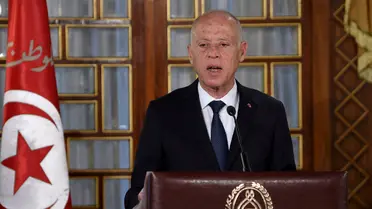Tunisian President Kais Saied announced a sweeping cabinet reshuffle on Sunday, affecting 19 ministerial positions, including the crucial portfolios of defense, foreign affairs, and the economy. The move comes less than a month before the presidential election scheduled for October 6.

In a statement released by the presidency, Khaled Shili was named as the new defense minister, while Mohamed Ali Nafti will take over as foreign affairs minister. The reshuffle follows Saied’s dismissal of Prime Minister Ahmed Hachani earlier this month, replacing him with Kamel Maddouri, who previously served as the social affairs minister.
Notably, the ministers of finance, justice, and interior have retained their positions amid the shake-up.
This significant reorganization of the government occurs against a backdrop of economic turmoil and widespread public discontent. Tunisia has been grappling with recurring water and electricity outages across much of the country, as well as shortages of essential goods and medicines. The cabinet reshuffle is seen as an attempt to inject new energy into the government and potentially attract voter support ahead of the upcoming election.

Saied, who consolidated power in 2021 after dissolving the elected parliament, is seeking re-election and currently faces two challengers. However, the electoral landscape has been marred by controversy, with opposition parties and human rights organizations accusing authorities of employing “arbitrary restrictions” and intimidation tactics to exclude potential contenders from the race, allegedly to ensure Saied’s re-election.
The president’s actions since 2021 have raised concerns about the state of democracy in Tunisia, which was once hailed as the success story of the Arab Spring. Critics argue that Saied’s moves, including the dissolution of parliament and the cabinet reshuffle, represent a regression in the country’s democratic progress.



